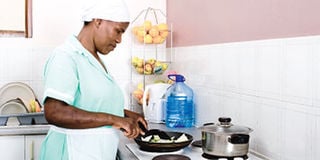One reason why you should be ashamed of your grocery bill

A domestic worker prepares a meal. What prevents you from valuing the services of those who make life more comfortable for you, such as your domestic staff, security guard, or the cleaners in your office? PHOTO | FILE | NATION MEDIA GROUP
What you need to know:
- So how long before we have an upheaval of the people of Mathare, Kawangware and Kibera against their paymasters?
- Lest you accuse me of inciting an uprising, history is littered with examples of revolutions sparked by economic and social inequity.
- What prevents you from valuing the services of those who make life more comfortable for you, such as your domestic staff?
It’s the end of the month and likely you and your well-heeled peers find yourself queuing up at a supermarket in an upscale mall somewhere in urban Kenya. As you finish paying, you make sure the receipt is surreptitiously tucked away. A momentary pang of guilt grips you as you realise the sum of your household shopping is more than your housekeeper’s salary.
The feeling is fleeting, however, as we load up our cars to drive home. After all we didn’t make the rules. We are only paying according to the prevailing norms of the labour market. So why should we care?
AMNESTY ON TAXES
The generic answer is that increasing inequality can be dangerous to that most sacred of rights — your health. Let me tell you why.
The fact that you are reading this means that umefika. You can officially choose to eat meat every day. It is likely that one of your teenage children’s chief complaints is that they don’t own the latest smartphone. I imagine you are relatively well schooled with a degree or two and have enough extra cash to shell out a few shillings for a Sunday paper.
The likelihood is that your financial woes are not related to the price of unga but rather to an amnesty on land taxes. And you are not alone in this world.
WAGE INCOME
Thomas Piketty, the eminent economist and author of Capital in the 21st Century, has gathered historical tax returns data to show that the top one per cent of the population in countries across the world are increasing their share of wealth over time.
Aha! you say, but I am not in that billionaire’s club! But it turns out that you only have to earn Sh110,000 net income per month to be considered one of the top one per cent richest people in the world.
One simple reason for this is that the returns from capital have outstripped the rise in wage income over time. In simple terms, wealthy people, like you, have the resources to own many more assets in the capital class such as buying a plot, opening a duka, your side hustle and so on. For the person who derives most of their livelihood from a salary, once the bills have been paid, there is little left over to invest or save to catch up with you.
SOCIAL MOBILITY
And so, as an old economics professor of mine would say: The rich get richer and the poor get children.
The counter to inequality within the confines of the American dream is ‘social mobility’. The dream that you can make it from modest beginnings to a Fortune 500 CEO, president or a manager from a blue-collar background. The jury is out as to whether this approach helps or hurts. The truth is that in this most capitalist of societies, a top earning American business executive earns 271 times the salary of their average employee.
BASIC INCOME
A more recent Scandinavian experiment being conducted involves the idea of providing every citizen with a Universal Basic Income; a guaranteed stipend that would be enough for every person to live above the survival threshold and experience the basic human dignity of choice, brought about by having financial resources. The moral hazard to this story is that it possibly incentivises those who are not inclined to work to continue with their jobless state.
And then of course there is the great equaliser of disease and pandemic, armed conflict and war. The problem with this solution is that it forces everybody to lose and indeed some pay with their lives. I vote that we do not wish Ebola on large swathes of the African continent nor a World War III-like disruption in order to create a flatter society.
RULING CLASS
What is clear, though, is that doing nothing is not an option.
In 1789, Louis XIV made the fatal mistake of raising the price of bread, thereby exacerbating the strain on an already debt-ridden and impoverished populace. The masses revolted, resulting in the French Revolution that saw the overthrow of the ruling aristocratic class and led to most of them, quite literally, losing their heads.
So how long before we have an upheaval of the people of Mathare, Kawangware and Kibera against their paymasters who are the residents of Lavington, Karen, and Muthaiga?
Lest you accuse me of inciting an uprising — the idea didn’t come from me. History is littered with examples of revolutions sparked by economic and social inequity, including in Russians and China.
INEQUALITY KILLS
My challenge to you, fellow Kenyan, is: What prevents you from valuing the services of those who make life more comfortable for you, such as your domestic staff, security guard, or the cleaners in your office? The monetary choice for you could be as simple as not eating in a fancy restaurant for Sunday lunch or buying a new item of clothing at some South African franchise.
Let’s stop smoking the ganja of privilege. Inequality kills.
The author is Managing Partner of C. Suite Africa, a boutique management consultancy. [email protected]





